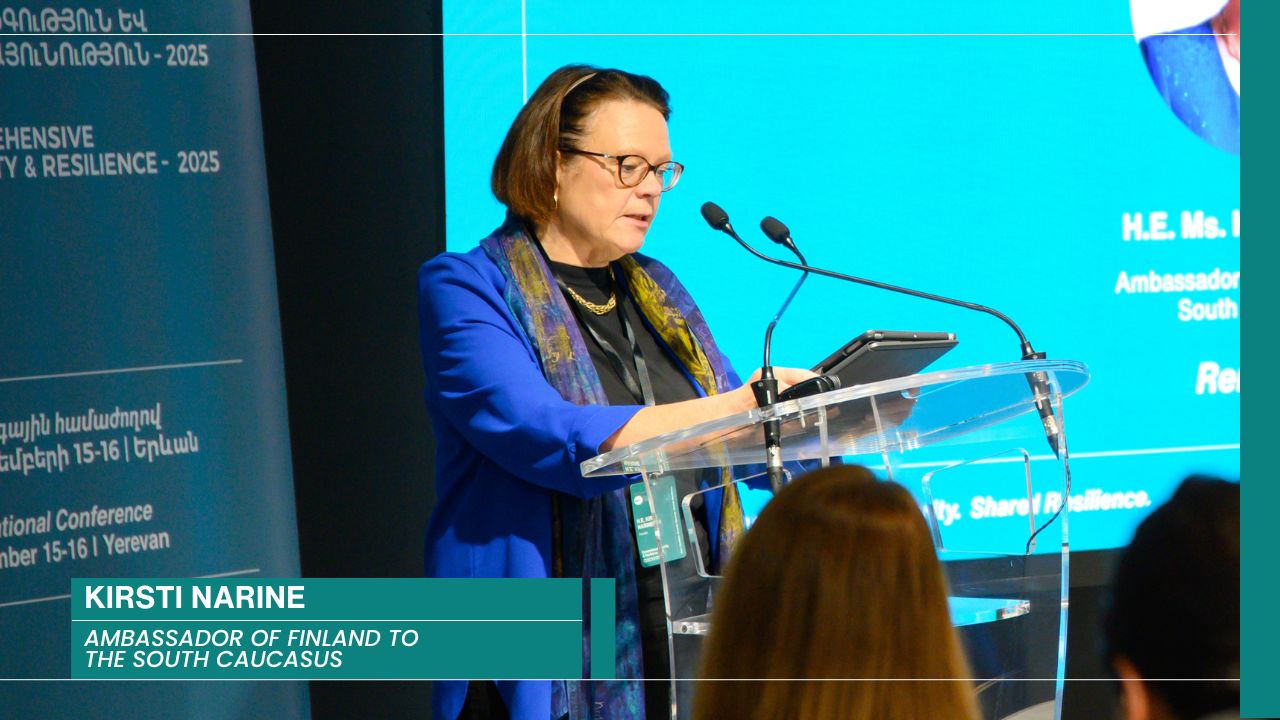Welcome remarks | H.E. Ms. Kirsti Narinen

Highly esteemed Mr. Prime Minister,
Experts,
Analysts,
Secretary General of the Security Council,
Dear diplomatic colleagues,
All of us who care about the resilient Armenia, and of course, dear Armine Margaryan, who is the heart, soul and brain of today’s event.
I started just my sixth year as an Ambassador of Finland to South Caucasus, all three countries. Very vivid years, which commenced with a war and have now developed both to a peace process with tangible results, as well as an increasing concept of stronger Armenian statehood.
Meetings and signings in Washington on August 8th were both historic and fundamental to further strengthening security and prosperity in the region. And Mr. Prime Minister, your brave statesmanship deserves our undivided respect.
Events like this are not born in a vacuum. When we with Armine Margaryan for the first time started discussing the concepts or the theme early 24, there was already a lot of domestic debate ongoing. National security strategy was being prepared. Armen Grigoryan had already visited Finland and Estonia and other countries as well. Your team had visited the region. And the European security debate was widening along with Russia’s illegal war of aggression in Ukraine, which for its part gave security a total new meaning and content in Europe. But I still think that we were not prepared to have such a speedy path to where we are here today. I want to thank you all for that.
My President, Alexander Stup, who has been very vocal and a very visible character in peace building in Europe lately, he always so usually crystallizes or kind of suggests us to crystallize our messages into three points. I try to do the same. So, what does comprehensive security mean? It’s actually a mindset which has its national characteristics, but the core of that is to understand that as threats are comprehensive, the security meaning responses to that also need to be comprehensive.
Previous President Sauli Niinistö gave a report for the European Union earlier this year, “Safer Together: Strengthening Europe’s Civilian and Military Preparedness and Readiness.” It is important that societies also function in crisis situations. The threats assessment has to be done reflecting the national parameters. But all of them seem to require the whole-of-society and whole-of-government approach, commitment and engagement.
The national security system should give all those who want to contribute to security a possibility to do so. And this means that military capabilities are of great importance, and their meaning should never be forgotten, but need to be complemented with other factors, because today’s security challenges are increasingly hybrid and complicated, which needs multifaceted attention.
And there is also a gender aspect in this, like Armine already mentioned, a narrow angle to security leaves actually women out, and I don’t think we can afford that in small or bigger countries. However, none of these is a copy-based system. Our systems are created by us and to us, and they work only in such a way for this particular country.
Secondly, using all available resources is of vital importance. In Finland and any country with limited resources, we cannot afford silos, we cannot afford non-coordination or noncommunication between stakeholders. We need and want to pool resources and use them efficiently. This means public-private partnership and active civil society participation, but also public sector, interagency strategic vision and operational cooperation.
Some examples. I worked as a diplomat in Estonia for many years, and there we have police border guard customs, so three experts who work with their Estonian partners because cross-border trouble always have multiple elements. Their seamless cooperation guarantees maximum problems for criminal cross-border activity with minimum cost. Another example, multifunctional guarding vessel Turva, which means safety or safe place, which is used for border control, maritime safety, search and rescue, as well as fishing control and oil and chemical spill response. So all these functions in one.
Third, comprehensive security and whole-of-society approach can be based only on democracy, fundamental freedoms and vivid civil society. Not one authoritarian system can allow civil activity in this field either. Democracy also requires high-quality education for the people to understand what is going on around them, to be media literate, for instance. Rule of law builds trust to authorities, but trust between citizens is equally important. Polarization undermines democracy and leads to divides and animosities within society, which produce a very fertile soil for outside influencing, thus weakening society and statehood and security.
Armenians have chosen democracy, which is a rare commodity in this neighborhood. Armenia has good building blocks for comprehensive security.
I hope that the coming discussions and panels would add pieces to the complex puzzle of countering all kinds of security threats. International cooperation in this sector is growing and needed.
We need to learn from each other. We all have vulnerabilities. All of us have vulnerabilities.
Changing exercises, experiences and learning from others will help us to counter them. Our adversaries are very much looking forward to taking advantage of and abusing the vulnerabilities. So, let’s be faster and let’s be smarter in building resilient Armenia and resilient Europe.
Thank you very much.